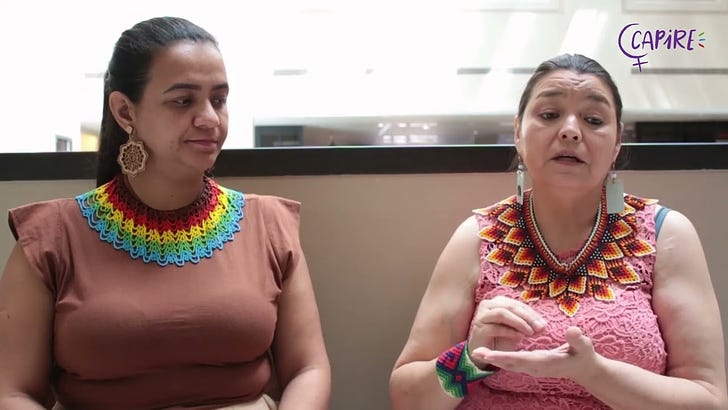Indigenous Women’s Struggles, Migrant Women’s Art and Culture, and Anti-Imperialist Feminism in Africa | Issue #21
Si desea recibir el boletín en español, haga clic aquí. Si vous désirez recevoir le bulletin en français, cliquez ici. Se deseja receber o boletim em português, clique aqui
👋 Hello, sisters of the world! Check out our new content:
✊ Claire Charlo and Shyrlene Huni Kui: “The global population has much to learn from the way of life and conservation practices of Indigenous peoples”
During an interview at the Rising Majority Congress in the United States, Indigenous activists discussed the shared struggles of Indigenous peoples worldwide against the causes of climate change and the advancement of transnational corporations. Claire Charlo is an Indigenous feminist organizer working for the Indigenous Environmental Network (IEN). Shyrlene Oliveira da Silva Huni Kuin lives on the Indigenous land Henê Baria Namakia, in Acre state, in the Brazilian Amazon. Their discussions are happening in the context of the preparations for the 2025 United Nations Climate Change Conference (COP 30), which will be held in Brazil.
🎞️ Rowshon Nipa: “Movies are the most powerful tools for revolutionary work”
Capire talked to Rowshon Nipa to understand migrants’ struggles in the US and their relation with arts and culture. She is a community organizer at Desis Rising Up and Moving (DRUM). “Desis are the South Asian and Indo-Caribbean folks. We work with these immigrants, youth and working class people here in New York City.”, she explains. During the conversation, Rowshon discussed the lives of migrant people in the US, her own journey of activism, and her filmmaking projects, which amplify the voices of migrant women’s struggles.
🌍 Anti-Imperialist Feminism on the African Continent
“Senegal really has a very rich history in terms of women's organization, and more so in terms of feminist struggle,” explains Ndeye Fatou Sarr, an activist with the World March of Women in Senegal. In her analysis, Fatou reflects on the current context of women’s struggles in the region and the challenges they face, including the impacts of the climate crisis, neocolonialism, and issues of democracy and governance in countries. This article is an excerpt from Fatou’s contribution during the webinar Feminist Voices Against Imperialism, organized by Capire on November 7.
👉 Visit Capiremov.org for more content on the feminist struggle to change the world!
Share this email! Sign up to our newsletter and follow us on social media (@capiremov). We need everyone's support to promote and expand the Capire portal!
Newsletter | WhatsApp | Telegram | info@capiremov.org
Facebook | Twitter | Instagram | YouTube | Spotify







